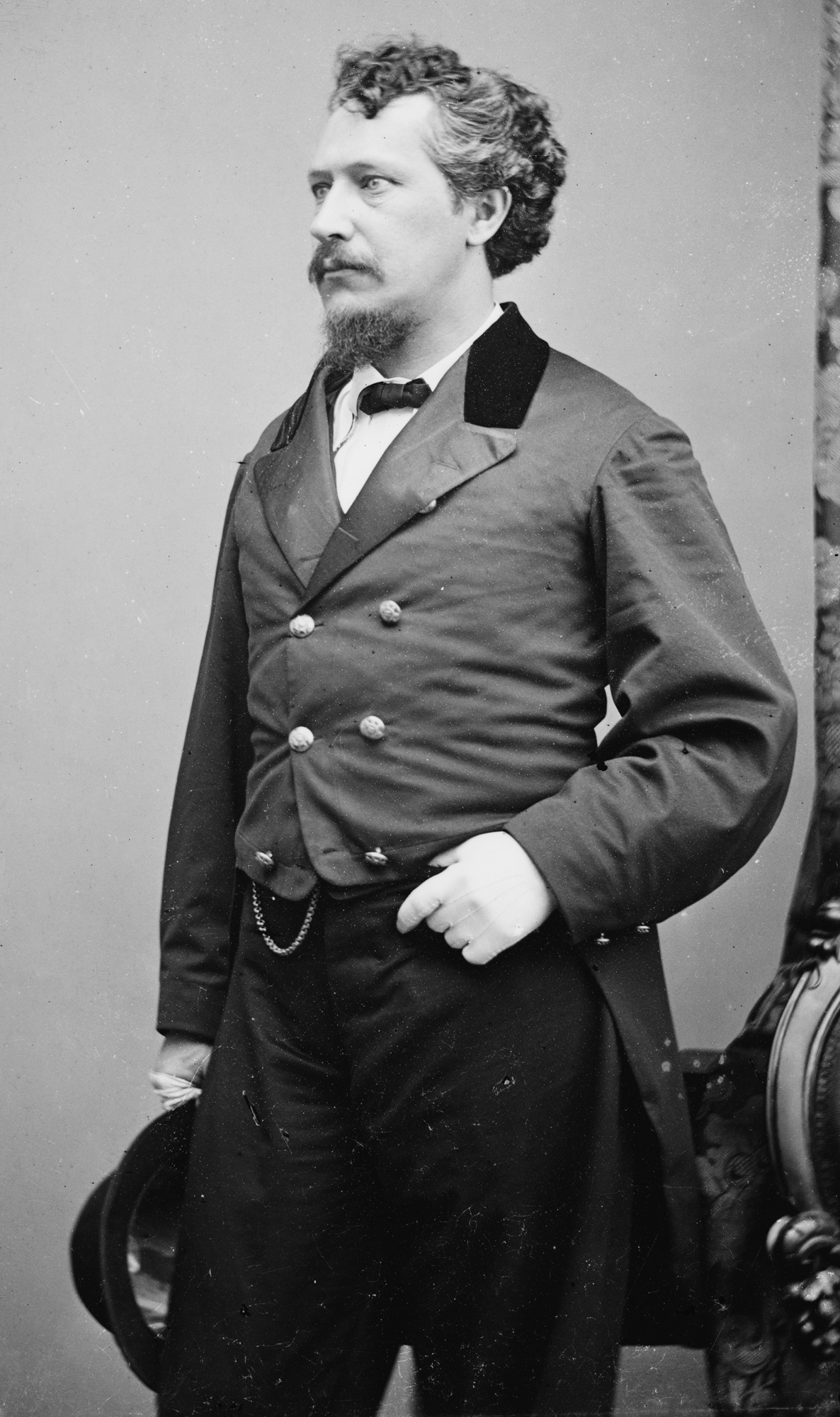- George Francis Train
Infobox Person
name = George Francis Train

caption =
birth_date = birth date|1829|3|24|mf=y
birth_place =Boston, Massachusetts
dead=dead
death_date = death date and age|1904|1|5|1829|3|24|mf=y
death_place =George Francis Train (
March 24 ,1829 –January 5 ,1904 ) was a businessman, author, and an eccentric figure in American history.Biography
Train was born in Boston,
Massachusetts in 1829. At the age of four he was orphaned inNew Orleans after ayellow fever plague killed his family. He was raised by his strictMethodist grandparents in Boston, who hoped he would become a minister.Throughout his life Train was engaged in the mercantile business in Boston and in
Australia , then went toEngland in 1860 and undertook to formhorse tramway companies inBirkenhead and London where he soon met opposition. Although his trams were popular with passengers, his designs had rails that stood proud of the road surface and obstructed other traffic. In 1861 Train was arrested and tried for "breaking and injuring" a London street. [Police News, "The Times", 27 Mar 1861]Referring to himself as "Citizen Train", he became a
shipping magnate , a prolificwriter , a minorpresidential candidate , and a confidant of French and Australian revolutionaries. He was offered the presidency of a proposed Australian republic, but declined.Train was likely the inspiration for
Phileas Fogg inJules Verne 's "Around the World in Eighty Days", although he managed to accomplish the feat in 67 days. A plaque inTacoma, Washington commemorates the start and finish point. (Note: The Tacoma trip was Train's third around the world and took place in 1880. It was not the trip that may have inspired Verne, which took place in 1870.) He was accompanied on the trip and many others by a long-suffering cousin and private secretary namedGeorge Pickering Bemis , who later became mayor of Omaha, Nebraska.While in
Europe after his 1870 trip, Train met with theGrand Duke Constantine . During that period he also persuaded theQueen of Spain to back the construction of a railway in the backwoods ofPennsylvania . This was the beginning of theAtlantic and Great Western railroad . He also promoted and built new tramways in Britain after some opposition, which was eventually overcome by offering to run the rails level with the street. [Street Tramways, "The Times", 26 May 1869]On his return to the U.S., Train's popularity and reputation soared. He began promoting the great
Union Pacific Railroad , despite the advice of Vanderbilt, who told him it would never work. Forming a finance company calledCredit Foncier of America , Train made a fortune from real estate when the great railway running from coast to coast opened up huge swathes of western America, including large amounts of land in Omaha,Council Bluffs, Iowa andColumbus, Nebraska . He was responsible for building theCozzens Hotel and foundingTrain Town in pioneer Omaha.Along with Credit Foncier, Train's most infamous creation was
Credit Mobilier , which he started specifically to sell construction supplies for the Union Pacific. That venture was torn asunder by scandals that rocked the nation. [McCague, J. (1964) "Moguls and Iron Men: The Story of the First Transcontinental Railroad." Harper and Row. p 135.]Train ran for
President of the United States of America as an independent candidate in 1872. He was a staunch supporter of thetemperance movement , and was jailed onobscenity charges while defendingVictoria Woodhull . He was the primary financier of the newspaper "The Revolution", which was dedicated towomen's rights , and published bySusan B. Anthony andElizabeth Cady Stanton .As he aged Train became more eccentric. He stood for the position of Dictator of the United States, charged admission fees to his campaign rallies and drew record crowds. He became a vegetarian and adopted various fads in succession. Instead of shaking hands with other people, he shook hands with himself, the manner of greeting he had seen in
China . He spent his final days on park benches inNew York City 'sMadison Square Park , handing out dimes and refusing to speak to anyone but children and animals. [Foster, A. (2002) "Around the World with Citizen Train ." Merlin Publishing.]He died in New York and was buried at a small private ceremony at
Green-Wood Cemetery . On his deathThe Thirteen Club , of which he was a member, passed a resolution that he was one of the few sane men in "a mad, mad world." ['Citizen' Train buried, "New York Times", January 22, 1904]Works by Train
* "An American Merchant in
Europe ,Asia , andAustralia " (1851)
* "Young America Abroad" (1857)
* "Irish Independency" (1865)
* "Championship of Women" (1868)
* "My Life in Many States and in Foreign Lands" (1902)References
*
External links
* [http://www.twainquotes.com/gftrain.html Twain on Train]
* [http://www.allenfoster.com/chap1.htm "Around the World with Citizen Train" ]
Wikimedia Foundation. 2010.
